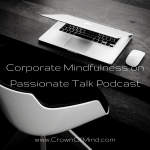Original Post: https://www.linkedin.com/pulse/career-mind-1-journal-trent-rhodes/
If you had to think about all you’ve accomplished at a recent job, would you be able to articulate your top 5 contributions?
What about your MVP (most valuable project)?
How about a situation that stretched your abilities, persuading you to evolve greater skills?
Or what about improvements? Can you describe precisely how you’re developing?
What about the age-old interview question: where do you see yourself in 1-3 years in your industry?
Unless you have an eidetic memory, these insights may fade away or never be captured in concrete form. This is where a career journal offers value.
For the writer, a journal serves numerous purposes: a multi-dimensional technology for transporting intangible ideas into externalized forms, available for future use.
For careers, it’s also a reflection tool can help solidify ideas during, post-job search and for on-the-job performance.
Journaling’s fundamental effects boast numerous health benefits while also serving as an instrument to explore concepts. Immersed in the art, the writer can acquire layered situational understanding.
The job search can involve energetic ups and downs, positive and disagreeable moments that can challenge a professional’s psyche. The rollercoaster nature of meeting people and venturing into opportunities where you don’t see the official end can toy with the reality that you are a worthy candidate primed for your next role.
The thoughts you put on the page can be used to arrive at angles adding to your ability to adapt.
The Career Journal: Some Applications
Far from exhaustive, some reasons you may write in the career journal include:
- Understanding reasons for an interview decline or progress. Why was this your outcome? Observations on how your interviewers communicated. What questions did they ask? How did they respond to your answers? How was their energy? What could you have communicated differently?
- Areas where you excel. Do you know your strengths? Have you reached a confidence level where you can communicate them and not feel bashful? If you feel hesitant to declare your skills, what’s stopping you? Can you talk about technical skills and interpersonal acumen?
- Areas you can improve. Have you done a SWOT (strength | weakness | opportunity | threat) analysis on yourself? How many perspectives can you articulate referencing goals and gaps? Have you understood the difference between “Why didn’t I succeed?” and “How can I improve so I can succeed?”
- Research and preparation to understand the company. What’s notable about your upcoming interviewers? Have you looked them up on LinkedIn? Do you see resonance with their experience and your own? Any unique points that could be worthwhile for future conversation? Can you speak about the company in your own words instead of regurgitate from the org. website?
- Thoughts about company values you appreciate. If asked, can you explain 3 values important to you in your next role? Can you give examples of them? How do they manifest in realtime with real people?
- Past experiences that taught you what you don’t want. These may include some of the unfortunate or displeasing career scenarios. With an alchemist’s mental frame, you can use journaling to figure out how these circumstances offered you clarity about what you do want. What were the situations? How did you respond? How did they strengthen your resolve to create a new reality?
- Assess your character. Why’s this important? Self-reflection is a transformation catalyst. How do you know what to change without being aware of it? How do you improve without tracking or attentiveness? How do you set a standard without knowing where your performance bar exists? With character we delve into personal qualities, different from pedigree, connections or what company you’re an Ex- of. Without a realistic self-observation of what your character radiates, refinement opportunities escape.
- The onboarding experience. The first 60-90 days. This is where you learn about who your main contacts are, resources, who you want to affiliate with beyond your department.
- Outline salary requirements and needs, your Why for the numbers. It’s interesting to me how fed up the general population seems to be about how compensation discovery occurs in interviews but not willing to try an approach other than what’s given companies the upper hand for so long. With your journal, be willing to explore your personal and financial goals. Use the journal to make them concrete. Avoid the FOMO influence that prevents you from having ranges and being precise about where you stand. Without a focus you wander by default. If you haven’t examined your financial situation and desires before, writing them may induce some nervousness as you see where you currently are and where you want to be. There tends to be a strong (but unnecessary) association between financial energy and human self-worth. Left unexamined, you can create a mental environment where you base your life solely on how much financially earned rather than seeing the energy as a resource for use.
Enhance the Experience
Working with the career journal doesn’t have to be formal; it allows for a free flow that a typed document structure won’t provide (an iPad and Apple Pencil can also do the job). You can draw, sketch, make mind maps associated with ideas. Let your mind play while it handles professional thought forms.
- Allow time for free writing during the day. For consistency and moments where imagination can reach heights, write in the morning and evening.
- Make it part of your work routine. If you have quarterly reviews with the supervisor for example, the journal can be an ally for collecting all that you’ve done.
- Choose a time to reflect or read your writing.
Enjoy the process. Be Well.










